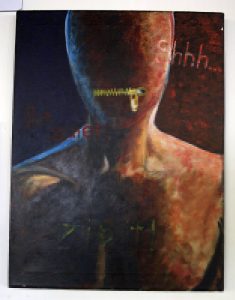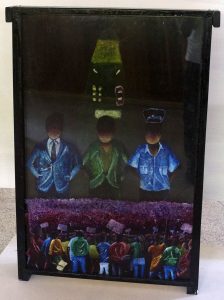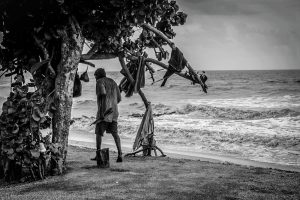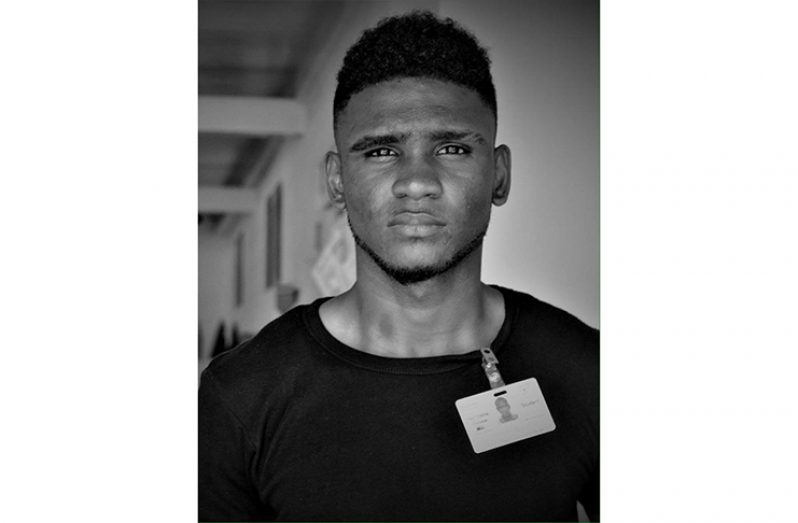By Dominique Hunter
AT just 22 years old, Herchelle Pellew is finding his niche, making works of art he hopes would spark more meaningful conversations about some of the pressing issues currently plaguing our society. But long before he began conceptualising socially engaged artwork he had a rather modest start, with early influences from both his grandmother and great grandmother.
In a recent interview, the former Hope Secondary School student discussed how a childhood affinity for art survived through the years and eventually led to a somewhat topsy-turvy start to his formal art pursuits.

“My grandmother was the one who saw that I was interested in art and she was the one who motivated me to follow it. She would purchase paper and pencil crayons and tell me to work. Whenever she was doing her craftwork she would let me help her. That was how I got started.”
Over the years, Pellew managed to sustain his passion for creativity despite not having the benefit of formal art training. He explained that although he could not pursue art at the Caribbean Secondary Education Certificate (CSEC) level since his school was not offering the subject, he refused to let that setback deter him from following his dream. It was at that moment, after being encouraged by a friend who studied in the same field, that he made the decision to enroll at the E.R. Burrowes School of Art.
“My expectation of the art school was a fun, free and cool environment. But when I got there I said to myself, ‘my God.’ It was really tough,” he said.
He admitted that he was quite taken aback by how different the school was in reality compared to how he had envisaged it prior to his enrolment. And in the midst of him settling into a “new normal” with the ever-increasing workload, he was served yet another curveball that ultimately forced him to change his course of study.

“My first choice for a major was photography and my second choice was graphic design. But I had to switch subjects because my tutor left. So I took up painting as my major and leather craft as my minor,” he said. “I often asked myself, ‘What am I still doing here?’ because I couldn’t do the subjects I wanted to do. Sometimes I felt as though I needed to leave but I had invested so much already. I had to change my mindset because I had a mental block. It was hard at first. But eventually I began to love painting and leather craft.”
Pellew explained that while it was difficult for him to switch the focus of his studies so abruptly, he was determined to complete the school’s programme. Rather than complain or worse, quit, he instead chose to find new ways of challenging himself with his media. He was able to build and sustain his enthusiasm by experimenting with things like pyrography and by combining various media to make work with strong social commentary.
“Before I start working I need to understand what I want to do. Since my work is about controversial social topics I usually have to do some research. And, as I continue to do research I would sketch some ideas and scrap other ideas,” he said. “I also try to talk to persons who have been through those situations so that I can understand how they feel. I cannot do work without research because I want to include as much as possible, even if it’s not directly seen by the viewer. Persons must be able to relate to it and in order for that to happen, I need to understand what I’m doing.”
When asked about his decision to centre his creative work on social issues Pellew explained that it was the result of witnessing the unfolding of deeply troubling situations in our society.

“Seeing what some people go through is tough, especially as it relates to domestic violence. It really affects me because I believe in equality. I believe that everyone is here to live a free life and they should be able to live freely [without fear],” he stated. “The aim of my artwork is to create dialogue with persons so that they can express how they feel. Most persons don’t talk about these things. They would probably sit and talk about a football match or celebrity gossip but they wouldn’t talk about things that are affecting them, and they usually have a lot to say.”
He went on to say that although we seem to live in a culture of silence and victim shaming that often prevent persons from speaking out against various forms of abuse, he is hopeful that things will eventually improve. In fact, he feels even more encouraged to continue his exploration of social issues after receiving positive feedback from persons who would’ve seen his work on display a few weeks ago at the Umana Yana benab.
“The public’s response to the work has been great. I was surprised actually. I really didn’t expect the response I got. I thought they wouldn’t be comfortable with the work but they were happy that I addressed the topics I did. So I feel like I accomplished what I set out to do.”
Pellew was quick to shut down some of the more popular misconceptions about art practitioners and offered some advice for anyone who might be considering a career in the creative field.

“Like any other career art is tough. But if you really love it you will stick with it. If I had to give some advice to a youngster in school I would say, ‘find yourself.’ When you find who you are as a person, your art will follow,” he said. “Art is much more than aesthetics. It can be used to fight and bring awareness to a lot of issues. We’re at the point where we need to make art functional. More needs to be done to educate the public about art and art appreciation, especially in the public schools.”




.png)









